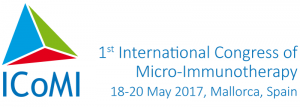The 1st International Congress of Micro-Immunotherapy (ICoMI) offers scientists and healthcare professionals the opportunity to meet, interact and exchange their experience on a highly topical issue:
Immunomodulation and chronic diseases
through the prism of autoimmunity:
new concepts, new perspectives
On the one hand, researchers are faced with the challenge of gaining a better understanding of the mechanism that lead to the development and progression of chronic diseases. On the other hand, practitioners are seeking to find long-term therapeutic solutions for their patients. The immune system represents the common point of interest for both professional groups, especially if we take into account that there is growing evidence for the contribution of alterations in cell subsets and their cytokine secretion to the pathophysiology even of “non-immunological” diseases like depression or Alzheimer's disease.
The new concept of autoimmunity
In classical theories, the development of autoimmune diseases has been associated with viral and bacterial infections. The mechanisms whereby non self-antigens lead to autoimmunity are known as «molecular mimicry». Nonetheless, biotechnological developments and advanced researches have unlocked new pathways.
For instance, it has been shown how genetic susceptibility might lead to autoimmune diseases in a propitious context. This susceptibility may be related to mutations affecting cell receptors like HLA-molecules that play a role in antigen presentation. Furthermore, studies have revealed that communication disorders between the innate and adaptive immunity would induce the differentiation of Th17-lymphocytes, which are implicated in autoimmune processes.
Recently, in the context of the study of the intestinal mucosa, the new concept of autoimmunity has emerged, which can be defined as the result of an excessive and inappropriate inflammatory process associated to a dysfunction of barriers. This concept may serve to explain not only autoimmune diseases but also various chronic pathologies – cancer, metabolic disorders etc.
Immunomodulation: a promising therapeutic approach
Micro-Immunotherapy and other therapies based on the modulation of the immune response, thus, offer a promising therapeutic approach to chronic diseases. Micro-Immunotherapy uses “low doses” of biotechnologically produced cytokines, specific nucleic acids (SNAs) and other immunoregulatory substances to provide targeted information to the immune system and restore its balance.
|
Educational objectives At the conclusion of this congress, you should be better prepared to:
– Define the new concept of auto-immunity |

